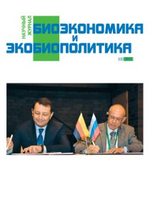Sugar Beet: a Sustainable Feedstock for the Bioeconomy
Автор: Koch T.J.
Рубрика: Тезисы
Опубликовано в Биоэкономика и экобиополитика №1 (1) декабрь 2015 г.
Дата публикации: 15.01.2016
Статья просмотрена: 10 раз
Библиографическое описание:
Koch, T. J. Sugar Beet: a Sustainable Feedstock for the Bioeconomy / T. J. Koch. — Текст : непосредственный // Биоэкономика и экобиополитика. — 2015. — № 1 (1). — URL: https://moluch.ru/th/7/archive/20/670/ (дата обращения: 03.04.2025).
Pfeifer & Langen is a European sugar company with a history lasting over 145 years. With its origin in Germany Pfeifer & Langen (P&L) expanded strongly in the last decades to the East European markets. In Germany P&L operates five sugar beet factories and one packing and distribution center. Moreover four factories in Poland, two in Ukraine, one in Romania are operated. Various sales offices in Mid/East Europe distribute the products. Today P&L is strongly present on the markets for food and feed. Additionally sugar and by-products are sold for applications in the chemical and fermentation industry since many years. A well-known example is the use of molasses in yeast and alcohol fermentation or the production of citric acid from crystalline sugars.
Most of the sugar produced by P&L is generated from sugar beet. Sugar beet is a seasonal crop. Average yields of 75-85 t/ha with a sugar content of 16-19% sucrose are known for the P&L growing area. Today all coupled products and by-products incurring while processing the beet to crystalline sugar are sold for use. Also pulp material, the extracted beet pulp or beet parts from washing the beets are popular feed material. Precipitated limestone descended from production is an established fertilizer.
Growing demand for renewable feedstock leads to new opportunities marketing the aforementioned by- and coupled products and the sugar products. Beet pulp is nowadays widely used in digesters for generating biogas. New approaches try to use beet pulp as a second generation feedstock for producing biochemicals e.g. lactic acid.
While in the value chain today most of the sugar syrup is converted into crystalline sugar, new fermentation technologies show major benefits in economy and ecology by using e.g. thick juice or raw juice in the beet campaign for producing biochemicals. Bio refinery concepts with a biotechnological factory next to the sugar factory seem to be a favored business case. Already established examples are known all over the world. For sugar beet the combination of a sugar factory, ethanol fermentation and a digester is a popular case.
Beside the use of sugar and sugar derived products for producing biochemicals the manufacture of functional carbohydrates by enzymatic process gains more relevance. Isomalt already being stablished since more than 20 years, was one of the first, but molecules like erythrithol and other sugars, e.g. rare sugars are following. Their various technological and health benefits offer opportunities for the sugar industry to enter into new markets. With its strong expertise in processing sugar beet into beet pulp and sugar products P&L is a strong partner for supplying biotech industry with feedstock and technological solutions to implement bioprocesses into sugar factories.
1







